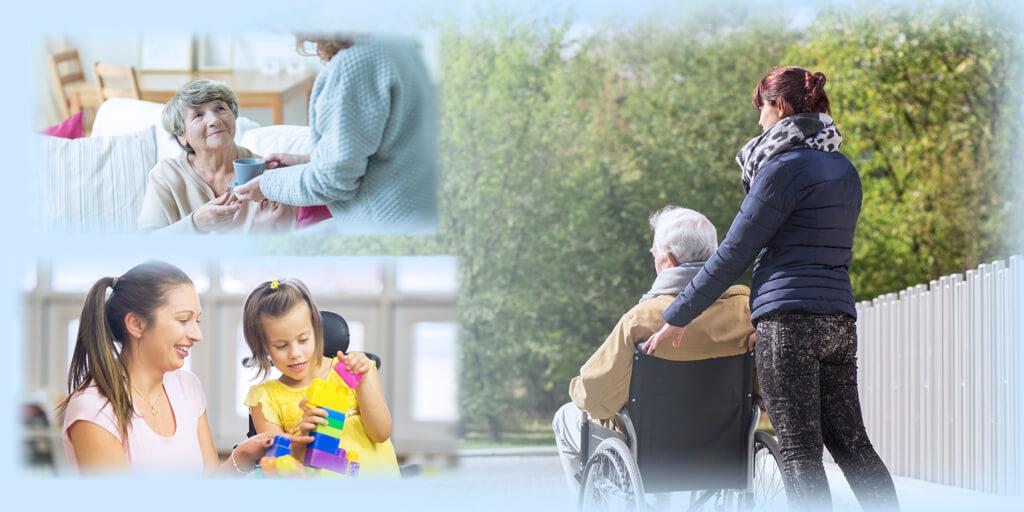
Women of Challenge
A young couple anxiously anticipates the birth of their second child. However, not long after she was born it was evident that something was terribly wrong. After examinations, she was diagnosed with a severe form of cerebral palsy. Another family prepares to care for their young adult son who was paralyzed with brain injury after a freak accident. They face years of physical therapy and daily care. And, a daughter decides to oversee her widowed mother’s care upon learning of her mother’s declining health due to osteoporosis and the beginnings of senility.
There are no words that can fully express the formidable challenges a family experiences with such diagnoses. The monumental financial, emotional and physical stress and responsibility that accompanies the daily care of a disabled family member is overwhelming, whether it is a disabled child, an injured adult or a declining senior. Thus, each of these families begins a long hard journey of caregiving, most of which will fall to a female family member.
The disabled child received the most up-to-date physical therapy, education and support. Although still disabled, she was found to be cognitively normal and was mainlined into the public school system at grade six. Years later she received a standing ovation as she struggled to walk across the stage to receive her high-school diploma. Everyone cried; the applause was thunderous! Concerning the paralyzed young adult, his condition was upgraded to where he eventually obtained the use of his arms; he was able to use a computer. His mother oversaw his education. However, he remained confined to a wheelchair. The widowed daughter managed her mother’s health and business affairs and arranged for her to move in with her family. They enjoyed a close friendship until her mother passed away ten years later.
The outcomes of the above examples are largely due to the many competent caregivers who were physicians, therapists, teachers, friends, volunteers and family who encouraged, taught, prayed, cared for and reached out to them and their families. Many of these caregivers were women.
According to a fact sheet, Women and Caregiving: Facts and Figures, published by the Family Caregiver Alliance, “Women provide the majority of informal care to spouses, parents, parents-in-law, friends and neighbors, and they play many roles while caregiving—hands-on health provider, care manager, friend, companion, surrogate decision-maker and advocate.”
Many women are thrust into caregiving by virtue of life’s roles and circumstances and are often seemingly challenged beyond their control, patience and abilities. It takes a very physically, emotionally and spiritually strong woman to face the primary responsibility and care for someone who is disabled.
What can women do to help a caregiver—whether family member, friend or neighbor—face the difficult challenge of caregiving? Having lived within a family with a severely disabled family member, I would like to offer several practical suggestions.
Be a friend; reach out. Proverbs 31:20 instructs, “She extends her hand to the poor, yes, she reaches out her hands to the needy.” Those who are caregivers of an infirm or disabled family member need someone who is friendly, understanding and supportive. Small acts of kindness and assistance are valuable. Isolation, depression, severe stress and anger are common conditions that plague caregivers.
Be a Good Listener. The art of listening is probably the most important aspect to helping someone through a difficult circumstance. Judgmental comments and unsolicited advice or suggestions can be very hurtful; in fact, they are unnecessary. Read an article or book which discusses the important art of listening. Most of the time, a caregiver just needs someone to listen. Just listen!
Give smiles, hugs, words and notes of encouragement. Acknowledging someone’s difficult circumstance with love and kindness can be very helpful; ignoring them and their emotional pain will isolate them, which is very hurtful. Simply sharing your care means a lot.
Education. If there is someone in your family, neighborhood or congregation who you don’t know how to help, contact the association, foundation or society which would most likely be able to help you understand or assist them in their circumstance. Knowledge is power.
Pray. Pray for those who are disabled and for their family and their caregivers. Pray for their healing, comfort, encouragement and help. And, also pray for God to show you how to help them (1 John 5:14).
Do these things, and you may well help to strengthen the hands of a caregiver and their ward more than you may ever realize!



